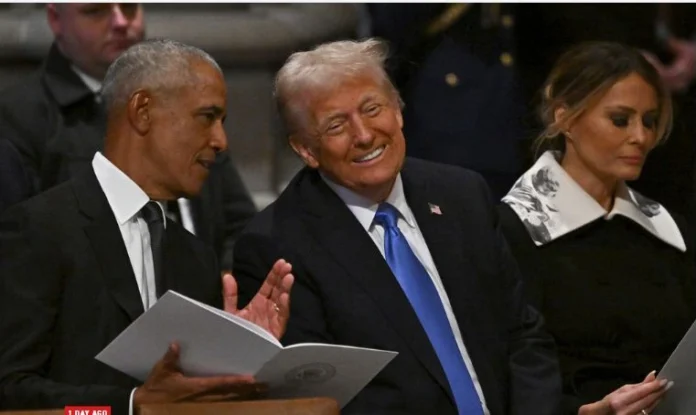President-elect Donald Trump’s first days of 2024 were anything but smooth. On January 9, he attended Jimmy Carter’s state funeral at Washington’s National Cathedral—a poignant reminder of the nation’s shifting moral compass. The next day, he participated remotely in a New York courtroom to hear his sentencing on 34 felony charges stemming from the Stormy Daniels hush money case. These two events captured a snapshot of Trump’s polarizing presence and the enduring legacy of Carter, who passed away at 100.
Carter’s Farewell: A Celebration of Character
The funeral drew former presidents, dignitaries, and global leaders, all united in honoring the 39th president. Carter’s life, celebrated for its humility and principled leadership, stood in stark contrast to the controversies surrounding Trump. Former Vice President Walter Mondale’s posthumous eulogy underscored Carter’s farsighted policies, including his push for renewable energy and women’s rights. Mondale poignantly noted, “We told the truth, we obeyed the law, and we kept the peace.”
Eulogies emphasized Carter’s steadfast dedication to justice and human dignity. President Joe Biden, who endorsed Carter’s 1976 campaign, reflected on his defining trait: character. Quoting Heraclitus, Biden reminded attendees that “character is destiny,” both for individuals and nations. The sentiment echoed Carter’s own mantra: to lead with honesty, respect, and unwavering commitment to public good.
A Moment of Reflection and Isolation
For Trump, Carter’s funeral was a subdued affair. Despite arriving early, he received little warmth from fellow attendees. Former President George W. Bush passed him without acknowledgment, while former Vice President Mike Pence shook his hand, though Karen Pence notably avoided interaction. Trump’s immediate company at the funeral was former President Barack Obama, a striking image that he seemed eager to manipulate for appearances. Melania Trump, seated nearby, remained aloof, her expression described as more relieved than disappointed.
The tributes to Carter underscored values seemingly at odds with Trump’s public persona. Grandson Jason Carter highlighted his grandfather’s life as a “love story” rooted in the biblical commandment to “love your neighbor as yourself.” His achievements, from eradicating Guinea worm disease to promoting global peace, were framed as acts of profound respect and partnership.
The Legal Reckoning: Trump’s Sentencing
On January 10, Trump’s attention shifted to legal troubles. Via video link, he joined a New York courtroom to face sentencing for his felony conviction in the hush money case. While Judge Juan Merchan issued an unconditional discharge, sparing Trump jail time, fines, or probation, the conviction left Trump labeled an adjudicated felon—a designation he vehemently decried as politically motivated.
In his remarks, Judge Merchan dismissed any notion of personal targeting, stating, “It is the legal protections afforded to the office of the president of the United States that are extraordinary – not the occupant of the office.” Trump’s appeals to the Supreme Court were denied in a 5-4 decision, further cementing his legal predicament.
A Nation in Transition
The two days highlighted a broader transition for the United States, grappling with the legacies of its leaders and the direction of its democracy. Carter’s life, defined by humility and service, served as a reminder of leadership rooted in values and vision. His work through the Carter Center, particularly in reducing Guinea worm disease from millions of cases to just 14 annually, exemplified his dedication to empowering marginalized communities.
Carter’s humanitarian efforts extended globally, but he also left an indelible mark on India. His 1978 visit, during which a village was renamed Carterpuri in his honor, demonstrated his commitment to fostering cross-cultural understanding. Decades later, he and Rosalynn Carter returned to India to build homes with Habitat for Humanity, a project that encapsulated their lifelong dedication to uplifting others.
—The writer has worked in senior positions at The Washington Post, NBC, ABC and CNN and also consults for several Indian channels.


